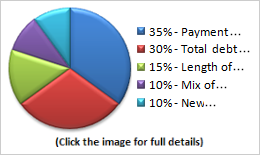Home > How to Avoid Bad Credit > How Are Collection Accounts Handled on a Credit Re...
How Are Collection Accounts Handled on a Credit Report?
Posted on December 2, 2010
When you struggle with debt issues, it likely will be no surprise to you to find that an account you haven’t been able to pay has been turned over to collections. This means your original creditor probably wrote off your bad debts and sold the account to an agency specializing in debt collections.
The biggest issue most debtors think about when accounts are sent to collections is the harassing, aggressive tactics often used by debt agencies who want their money. However, concerning your financial status, there are more important issues at stake. When your account is sent to collections it has a significant impact on your credit report and score.
First, because the original creditor ‘charged off’ the account, your credit report may reflect that status in addition to the ‘in collections’ status from the debt collection agency. This means your credit history and score has two strikes against it for the same account. While both strikes may show on your report, the main focus will be placed on what your original creditor states and not so much on what the collection agency reports.
How Can It Be Fixed?
It can be tempting to continue ignoring the debt collection notices coming from the collection agencies but it is in your best interest to make good on all your debts. By paying your remaining balance through the original creditor, you stand the chance of having your account status changed to be reported as a zero balance. Part of your negotiation with the original creditor should include the agreement to pay debts in full provided a change in status for your credit report would be given.
It is always best to pay the full balanced owed. If you negotiate a settlement with your creditor, your credit report will reflect a ‘Settled’ status that also hurts your credit report. If fact, settling for an amount less than owed can be more detrimental to your credit score than if you hadn’t paid on the debt at all. Settling with a debt collection agency may or may not leave a mark on your score, depending on the situation.
Negative items will remain on your credit report for a period of 7 years or more from the time you have ceased making payments on the account. If you are not in the market to purchase a home or seek other types of financing, you can wait out the time period and let the debts drop off without additional effort. However, seven years is a long period of time to consider not needing your credit or additional financing. It is in your best interest to make an effort to zero out your debt balances with the original creditor. By being progressive about eliminating old debts now, you can boost your credit score in a faster period of time and get back on financial track sooner.
Follow Up/Follow Through
If you want to get rid of debt collection calls and the worry of outstanding debts, it is imperative you have plan to pay off the balance in full by focusing all of your extra cash towards what you owe. Figure out how long it will take you to come up with the money or if you can spare it now.
Make contact with your original creditor (you can find the information on your credit report) and offer the payment in full. Some creditors may allow you to break up the payments over several months for larger balances but you must stay on task and make those payments on time until the debt is paid in full. During your proposal to make full restitution, ask your creditor’s representative if the debt can then be reported to the credit bureaus as being paid in full. Customer service representatives may not be able to make this call so ask to speak to a manager who has the power to grant your request. Get the confirmation of your request in writing and don’t give up until you do.
Don’t let the communication die out after you make payment. You need to follow through to make sure you paid as you have agreed and that in turn the creditor has reported the updated status to the credit bureaus. Keep the lines of communication open until the account is reflected positively and you begin to see an increase in your credit score.
Similar Posts:
- How to Repair Credit After a Lender “Charge Off”
- How to Deal With Collection Agencies on Your Credit Report
- Why You Shouldn’t Let Old Accounts Fall Off Credit Reports
- Dispelling a Credit Myth: Medical Bills Can Hurt Credit
- What Are The Stages of Late Credit Card Payments?







Let's connect!